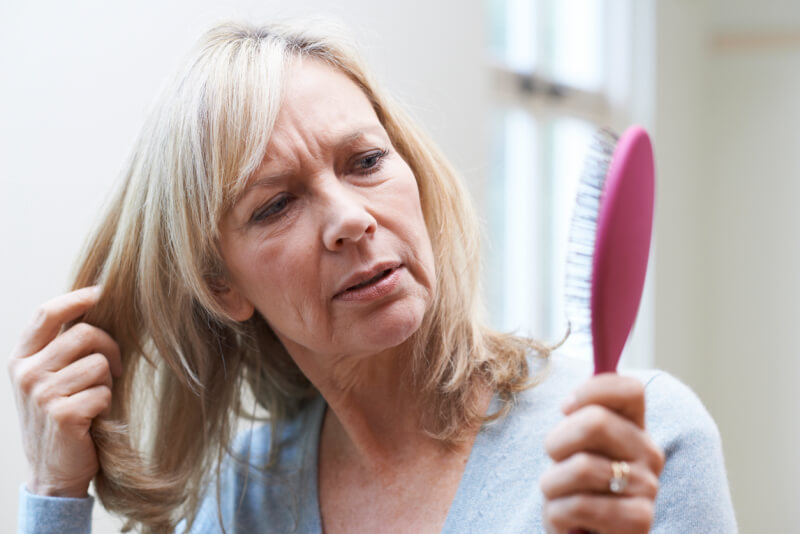
Hormonal changes are responsible for the major changes in a woman’s body — may it be puberty, pregnancy, or menopause. These hormonal imbalances are only natural as we age, but they cause negative symptoms that affect our daily lives. If you’re experiencing early menopause symptoms, it might be time to consult your doctor about getting HRT.
So what are the symptoms that tell women they need hormone replacement therapy? Hormone therapy is an effective treatment for women who experience different menopause symptoms, such as vaginal dryness and hot flushes. Women who experience low libido, mood swings, hair loss, and lack of sleep should also start talking to a medical professional about taking menopausal hormone therapy.
Every woman goes through menopause as they age. It’s a natural biological process that occurs between the ages of 45 and 55. However, around 1% of women experience menopausal symptoms even if they haven’t reached 40 yet. In such cases of “premature menopause,” HRT might be a useful treatment to stabilize the hormone levels and relieve painful symptoms.
Still unsure if you should get HRT? Here are five symptoms that women should look out for before considering hormone replacement therapy:
Hormones are directly related to sex drive and libido, which is why hormonal imbalance is the main cause of problems in the bedroom for most couples. Hormones also dictate the performance and the pleasure a person experiences. For women, the lack of progesterone and oestrogen result in intimacy problems.
Hormone imbalance in women usually occurs during menopause. Their estrogen levels drop, making the vaginal tissues dry and the individual less interested in intercourse. Both of these factors result in uncomfortable and sometimes painful sex. A menopausal woman may still experience satisfying intercourse during this period, but a hormonal change makes it normal for them to suffer from low libido.
Low libido caused by hormonal imbalance in women also occurs during pregnancy and after giving birth. In addition to the hormonal change, women also experience fatigue, physical changes, and psychological pressure to care for a baby. All these factors result in a huge change in their sexual desire.
Hormone therapy helps restore hormone balance in the body and relieve symptoms of genitourinary syndrome of menopause (GSM) that makes intercourse uncomfortable. Estrogen therapy comes in different types like gels, patches, pills, and sprays.
Another sign of hormone deficiency is frequent mood swings. While some mood swings are normal, frequent and severe mood changes should be treated as a serious sign to get hormone replacement therapy.
Feelings of sadness and irritability are two of the most common emotions experienced by women with hormone imbalance. Some of them also exhibit symptoms of depression. Patients learn different ways to relax and reduce stress, but an HRT might be more effective for most cases.
Short-term HRT alleviates mood swings and helps with other symptoms of menopause, but it’s important to consult with an expert first. Hormone replacement therapy for emotional disturbance, depression, anxiety, and nervousness come with increased risk factors. Consulting with a doctor helps patients decide if the benefits of HRT outweigh its risks.

Genetics plays a big role in the development of hair loss in a person, but their hormones are also responsible for the breakdown of hair. Dihydrotestosterone (DHT) is a derivative hormone of testosterone that causes healthy hair follicles to shrink and fall out.
Hair loss is more evident in men than in women because they have more levels of testosterone in their bodies. But when women experience a rise in the testosterone levels in their blood due to hormonal imbalance, the DHT becomes a big problem that results in hair loss.
Aside from the presence of DHT in the blood, stress also causes hair loss in women. When they undergo extreme levels of stress, their adrenal glands work harder to produce the stress hormone called cortisol. Hyperactivity of the adrenal glands results in hormone imbalance that leads to hair thinning and loss.
HRT is a viable treatment for patients who experience hair loss as a result of hormone imbalance. This might include pills, estrogen therapy, or hormone replacement for progesterone. Doctors might also prescribe anti-androgen medications to treat hair loss in some patients with polycystic ovary syndrome.
Hormonal changes also affect the sleeping pattern in women. They’re more vulnerable to different sleeping problems whenever their hormone levels spike or drop. It may be during their menstrual period, during and after pregnancy, and before going through menopause.
Sleep disturbance during the menstrual cycle isn’t as common as during pregnancy or menopause but it’s possible to occur. The fluctuation in the body’s hormone level, particularly progesterone and estrogen, disrupts sleep in some women who are a few days away from their menstrual cycle. Hormonal birth control helps stabilize the levels of these hormones in the body if they want to experience a good night’s sleep.
A shift in hormones also happens during the postpartum stage. Sleeping disorders during postpartum, combined with the pressure and responsibility of caring for a newborn baby, put mothers at risk of postpartum depression. Taking low-dose estrogen helps them restore hormone balance without interfering with their lactation.
Perimenopausal women with declining levels of estrogen experience sleep disturbance. They usually have hot flashes at night, along with irritability that affects their quality of sleep. But once they reach the menopausal stage (when they don’t experience the menstrual cycle for at least a year), their sleep quality becomes better and hot flashes become less frequent. This is also true for postmenopausal women.
Every woman goes through a period of menopause as they reach a certain age. This phase refers to the absence of a menstrual cycle for at least 12 months. The transition to menopause is often associated with different symptoms that start during the perimenopause period. These symptoms often include:
Menopause is a biological process experienced by women as they age. During this stage, the body produces less progesterone and estrogen, the hormones responsible for regulating menstrual cycles. The ovaries also stop producing eggs during this period.
But aside from aging, other factors might trigger menopause earlier than expected, such as:
Diagnosing menopause in women involves studying the menstrual cycle history of the patient and the presence of menopause symptoms. Women aged 45 who are experiencing menopausal symptoms are usually considered perimenopausal (early menopause stage).
However, certain blood tests must be done to rule out other condition, such as:
Most symptoms of menopause don’t require treatment. But if a patient experiences severe symptoms that interfere with their daily life, it might be time to talk to a medical professional about hormone replacement therapy.
Menopausal HRT involves the use of progestin and estrogen to balance the body’s hormone level. Women who already had their uterus removed through hysterectomy only need estrogen therapy.

Hormone replacement therapy works best for women under 60 who experience different vasomotor symptoms. However, this treatment is associated with certain risks, so it’s important to talk to a medical professional first to understand the treatment better and make an informed decision.
Read more: How Long Should a Woman Be On Hormone Replacement Therapy?
HRT medication contains synthetic hormones that replace the ones produced by the patient’s body. It’s the most common treatment for menopausal symptoms, such as vaginal discomfort and hot flashes. A consultation with a doctor determines whether a patient needs estrogen therapy or combination therapy.
Bioidentical hormone replacement therapy (BHRT) is a unique kind of HRT that uses bioidentical hormones derived from plant estrogens. This is different from the traditional HRT medications which are made from a pregnant horse’s urine (conjugated equine estrogen) and other synthetic sources.
Manufacturers of bioidentical hormone therapy medication claim that their products are safer and more effective than traditional HRT because the hormones used are identical to the ones found in the body. However, there isn’t enough evidence to back this claim. The risks associated with both treatments are also similar.
HRT is an excellent treatment for different menopausal symptoms, but they’re not always the best procedure for everyone. Patients aren’t qualified for HRT if they’re diagnosed with:
Aside from relieving different menopausal symptoms, HRT also helps reduce the risk of different health conditions that affect menopausal and postmenopausal women including:
Before recommending HRT as the primary treatment for menopausal symptoms, doctors consider different risk factors that might affect the patient’s health. HRT patients have different levels of vulnerability to HRT complications based on their:
Like any other medical treatment, HRT also comes with a few side effects like:
While HRT helps reduce the possibility of developing some health conditions, it might also increase the risk for others. Breast cancer risk is one of the biggest drawbacks of combined HRT for women.
The risk of developing breast cancer is greater with combining progestogen and estrogen than with estrogen alone. The benefits and risks are often considered by the physician to decide if HRT is the best possible treatment for each patient.
Read more: Which Side Effects Are Most Common Among Women Taking Hormone Replacement Therapy for Menopause?
Although many patients are skeptical about taking HRT because of the associated risks and possible side effects, it’s still the most effective treatment that restores hormone balance in the body. Talk to your physician about the following ways to help reduce the risks of HRT:
Starting to notice early signs of menopause in the body? Revitalize You MD is a trusted source of safe and effective HRT in Roswell. Our highly trained staff is dedicated to helping each patient recapture their body’s physiological peak by correcting hormone imbalance.
Find out if HRT is the right treatment for you by consulting with our licensed medical staff here at Revitalize You MD today. Visit our website to book an appointment with us and learn more about this treatment.
The staff is great, the products work!! I am very pleased with my results!